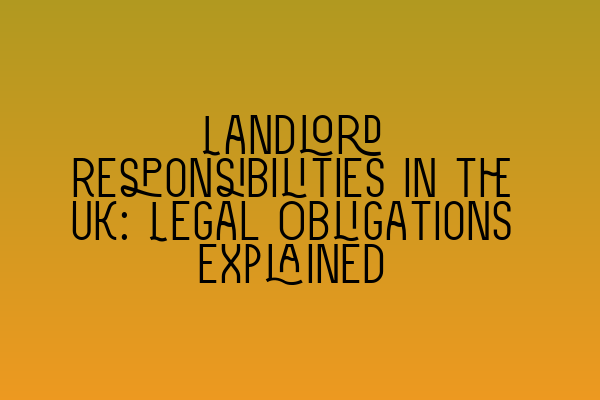**Landlord Responsibilities in the UK: Legal Obligations Explained**
As a landlord in the UK, it is crucial to understand your legal responsibilities and obligations to ensure smooth and compliant tenancy agreements. Failing to meet these obligations can lead to significant financial penalties and legal consequences. In this blog post, we will provide a comprehensive guide to landlord responsibilities in the UK, explaining the legal obligations you must adhere to.
**1. Providing a Safe and Habitablename Environment**
First and foremost, landlords in the UK are legally required to provide a safe and habitable environment for their tenants. This includes ensuring the property meets health and safety standards, such as proper ventilation, functioning heating systems, secure locks, and electrical safety. Regular maintenance and inspections should be conducted to identify and rectify any potential hazards.
**2. Repairs and Maintenance**
Landlords have a duty to carry out necessary repairs and maintenance in the rental property. This includes fixing structural issues, maintaining plumbing and electrical systems, and addressing any other problems that may arise during the tenancy. Promptly responding to tenant’s repair requests is essential to maintain a good landlord-tenant relationship.
**3. Gas and Electrical Safety**
Ensuring gas and electrical safety is a crucial responsibility for landlords. An annual gas safety check must be conducted by a Gas Safe registered engineer. The safety certificate should be provided to the tenant before they move in and renewed annually. Similarly, electrical systems and appliances should be regularly inspected by a qualified electrician to meet legal requirements.
**4. EPC and Energy Efficiency**
Providing tenants with an Energy Performance Certificate (EPC) is mandatory in the UK. The EPC rates the energy efficiency of the property and provides recommendations for improvement. Landlords must ensure their rental property meets the minimum energy efficiency standards. From April 2020, properties with an EPC rating of below E cannot be rented out.
**5. Tenancy Agreements and Deposits**
It is essential to provide tenants with a written tenancy agreement that outlines their rights and responsibilities as well as the terms and conditions of the tenancy. The agreement should comply with the latest legislation, including the Tenant Fees Act 2019. Landlords are also required to protect tenant’s deposits in a government-approved Tenancy Deposit Protection (TDP) scheme within 30 days of receiving it.
**6. Fire Safety**
Landlords must ensure that their rental properties meet the necessary fire safety standards. This includes providing functional smoke alarms on each floor, carbon monoxide detectors in properties with solid fuel appliances, and fire-resistant furnishings. Conducting regular fire risk assessments is advised to identify and address any potential fire hazards.
**7. Right to Rent Checks**
Under the Immigration Act 2014, landlords have an obligation to conduct Right to Rent checks on their tenants to ensure they have the legal right to live in the UK. Landlords must verify the identity and immigration status of all adult tenants and keep records of the checks. Failing to comply with these checks can result in severe penalties.
**Conclusion**
Being a landlord comes with a range of legal responsibilities and obligations in the UK. From providing a safe and habitable environment to ensuring gas and electrical safety, landlords must meet various standards to comply with the law. Understanding and fulfilling these obligations is not only essential for the well-being and satisfaction of the tenants but crucial for landlords to avoid legal consequences. By staying informed and up-to-date with the latest legislation, landlords can effectively meet their legal responsibilities and maintain successful tenancies.
For further information on the SQE (Solicitors Qualifying Examination), please refer to the following related articles:
– [SQE 1 Practice Exam Questions](https://fqps.co.uk/sqe/sqe1-preparation/mcq-practice-quiz)
– [SQE 1 Practice Mocks FLK1 FLK2](https://fqps.co.uk/sqe/sqe1-preparation/practice-mocks-quiz)
– [SQE 2 Preparation Courses](https://fqps.co.uk/sqe/sqe2-preparation)
– [SQE 1 Preparation Courses](https://fqps.co.uk/sqe/sqe1-preparation)
– [SRA SQE Exam Dates](https://fqps.co.uk/sqe/sqe1-sqe2-exam-dates)
